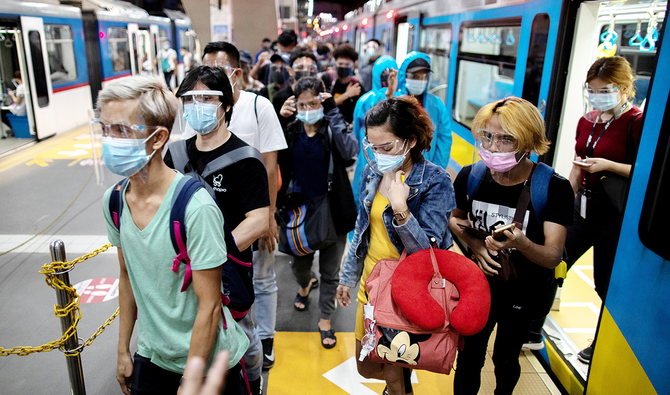MANILA: In a “milestone” move, the Philippines House of Representatives has approved a bill declaring the first day of February as National Hijab Day every year to promote a “deeper understanding” of the Muslim practice, as well as tolerance for other faiths across the country.
Congress unanimously approved the bill, which has yet to become a law, on Tuesday, Jan. 26, with all 203 lawmakers voting for the move.
Anak Mindanao party-list Representative Amihilda Sangcopan, principal author and sponsor of House Bill No. 8249, thanked all lawmakers for passing the legislation and called on members of the Senate to espouse a counterpart measure.
The legislation seeks to promote a greater understanding among non-Muslims about the practice and “value of wearing the hijab as an act of modesty and dignity to Muslim women” and encourage Muslim and non-Muslim women “to experience the virtue of wearing it.”
The measure also aims to stop discrimination against hijabis and clear misconceptions about the sartorial choice, which has often been misinterpreted as a symbol of oppression, terrorism and lack of freedom.
The bill also seeks to protect the right to freedom of religion for Filipino Muslim women and “promote tolerance and acceptance of other faiths and lifestyles” across the country.
Sangcopan said that “hijabi women have been facing several challenges across the globe,” citing examples of “some universities in the Philippines who had banned Muslim students from wearing the hijab.”
“Some of these students are forced to remove their hijab to comply with the school’s rules and regulations, while some are forced to drop out and transfer to other institutions. These are clear violations of the student’s freedom of religion,” she said.
The passage of the bill, she added, would “contribute greatly to putting an end to discrimination against hijabis.”
“Wearing the hijab is every Muslim woman’s right. It’s not just a piece of cloth, but it is said to be their way of life. It has been explained in the Muslim holy book, the Qur’an, that it is obligatory for every Muslim woman to guard their chastity and modesty,” Sangcopan said.
Dr. Potre Dirampatan Diampuan, a trustee of the United Religions Initiative’s Global Council, welcomed the “milestone” legislation.
“It is an exercise in what we call inclusiveness. I think it’s a very welcome move in the eyes of the Muslim community,” Diampuan told Arab News.
“A woman wearing a hijab here always gets a second look. This bill will make it so that the sight is a common one. The hijab will become part of our wardrobe as Filipinos,” she added.
According to the Philippine Statistics Authority, there are more than 10 million Muslims in the Philippines out of a total population of 110,428,130 based on the latest UN data. Diampuan said that the bill was a “recognition of the Muslim population in the country” and rejected the idea that wearing a hijab was akin to oppression.
“Unless you have embraced the religion and understood it, you will not appreciate the culture,” she said, adding that the move could further encourage women’s empowerment in the country.
“Women must be appreciated not by their looks but what they know, what they do and what they contribute to society…Where secular society says that beauty is in the eye of the beholder, I think Islam would say that beauty is in the heart of the person,” Diampuan said.
The bill mandates the National Commission on Muslim Filipinos to celebrate National Hijab Day by promoting and raising awareness about hijabis in the Philippines.
During the 17th Congress, a similar bill was introduced by Sitti Djalia “Dadah” Turabin-Hataman. It cleared a third and final reading in the House of Representatives. Sangcopan’s bill, which was recently approved, was filed in 2018.
The hijab is a veil that covers the head and chest and is mainly worn by Muslim women who have reached puberty, in the presence of adult males outside of their immediate family.
It also refers to any head, face, or body covering conforming to a certain standard of modesty for Muslim women, with those wearing it referred to as hijabis.
Islam is the Philippines’ second-largest religion, with most Muslims residing in the Mindanao island.
Within Mindanao is the Autonomous Region in Muslim Mindanao, comprising the Basilan, Lanao del Sur, Maguindanao, Sulu Tawi-Tawi provinces, but excluding Isabela City in Basilan and Cotabato City in Maguindanao.




























